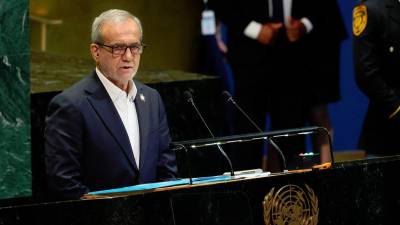UNITED NATIONS: Sweeping United Nations sanctions appear certain to return on Iran despite a last-ditch effort by China and Russia to delay their implementation for further negotiations.
European powers have been urging Iran to reverse several steps it took following Israeli and American airstrikes on its nuclear facilities in June.
The Europeans triggered the return of comprehensive UN sanctions after determining Iran had not complied with a landmark nuclear deal that has since become inactive.
These sanctions, which notably target Iran’s banking and oil sectors, are scheduled to take effect at the end of Saturday.
China and Russia presented a draft resolution during a Security Council session on Friday that proposed a six-month extension for talks until April 18, 2026.
Diplomats indicated they did not expect the draft resolution to secure the necessary nine votes from the 15-member Security Council for approval.
French President Emmanuel Macron met with Iranian President Masoud Pezeshkian on Wednesday and stated a deal was still possible to avert the sanctions but that Iran had only hours to act.
One diplomat speaking anonymously said the Europeans believed they had exhausted all options to facilitate progress but Iran failed to demonstrate the required flexibility.
France, representing itself along with Germany and Britain, has demanded that Iran grant full access to UN nuclear inspectors and immediately resume nuclear negotiations.
The European powers also insist on transparency regarding Iran’s stockpile of highly enriched uranium, which has been the subject of widespread speculation.
The original 2015 agreement, negotiated during Barack Obama’s presidency, lifted sanctions in exchange for Iran significantly scaling back its nuclear programme.
President Donald Trump withdrew the United States from the deal during his first term and imposed extensive unilateral sanctions while pressuring European nations to follow suit.
The Chinese and Russian draft resolution calls on all initial parties to the nuclear agreement to resume negotiations immediately.
Iranian Foreign Minister Abbas Araghchi met British counterpart Yvette Cooper on Thursday to discuss the escalating dispute.
The Iranian foreign ministry stated that Araghchi strongly criticised the position of the three European countries as unjustified, illegal, and irresponsible.
Steve Witkoff, a Trump associate who had been negotiating with Iran, said Iran was in a difficult position but expressed hope for a resolution.
Witkoff stated the US desired a permanent solution through negotiation but would proceed with sanctions if necessary.
Iran has consistently denied seeking nuclear weapons, citing a religious edict from Supreme Leader Ayatollah Ali Khamenei, and US intelligence has not concluded Iran decided to build a bomb.
Israel, the United States, and European nations remain sceptical due to Iran’s advanced nuclear capabilities, believing it could rapidly develop a weapon.
President Pezeshkian displayed photographs at the General Assembly this week of individuals killed during a 12-day Israeli military campaign against Iran in June.
Tehran claims the Israeli campaign, which the United States joined on June 22 with strikes on nuclear facilities, resulted in over 1,000 fatalities. – AFP
